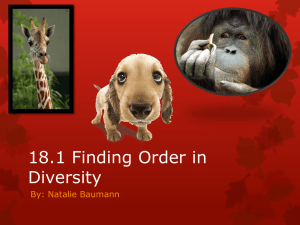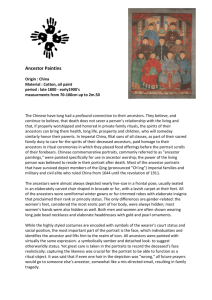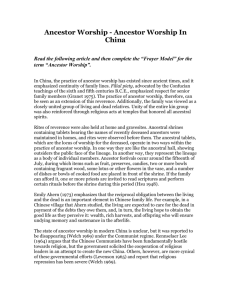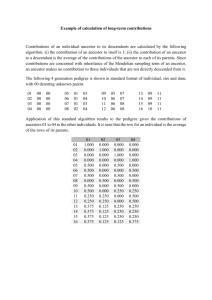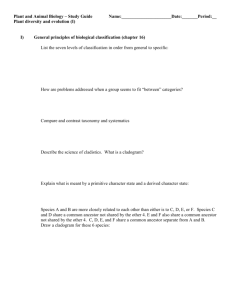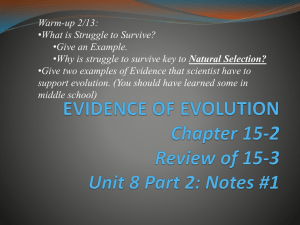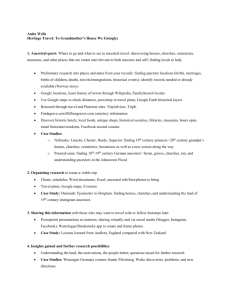14 CHRISTIAN THEOLOGICAL LITERATURE
advertisement
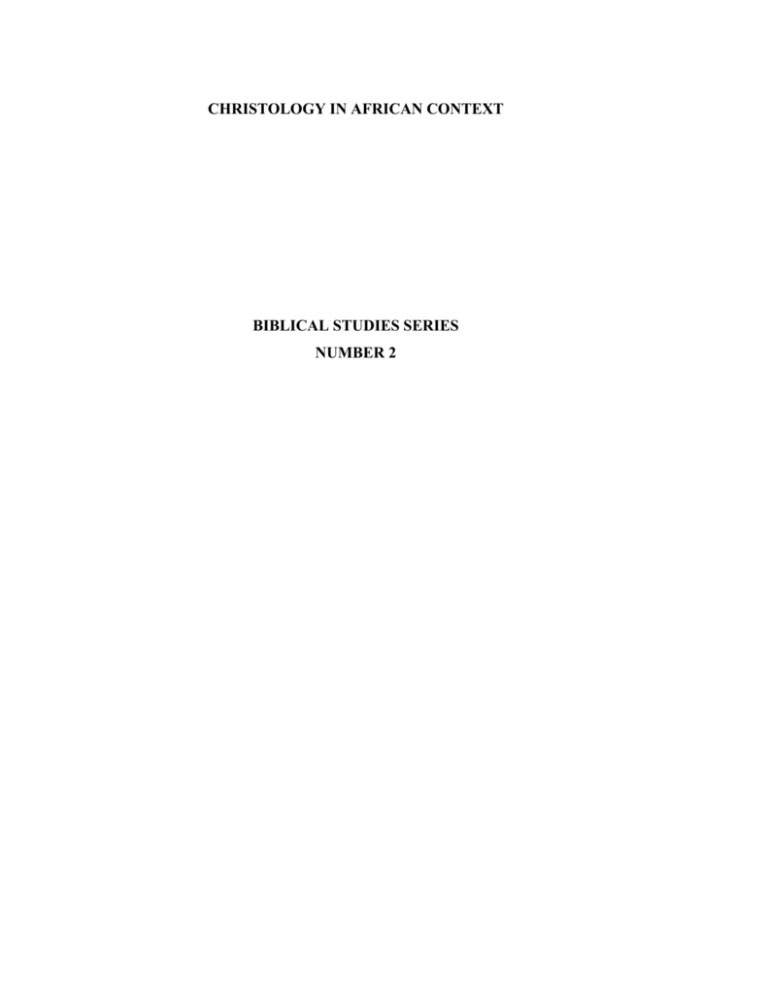
CHRISTOLOGY IN AFRICAN CONTEXT BIBLICAL STUDIES SERIES NUMBER 2 CHRISTIAN THEOLOGICAL LITERATURE ON ANCESTOR - VENERATION IN AFRICA: AN OVERVIEW. BY PIUS OYENIRAN ABIOYE, DEPARTMENT OF RELIGIONS, UNIVERSITY OF ILORIN. This paper derives mostly from my doctoral thesis on ancestor veneration in Yorubaland, as a Christian theological inquiry. How scholars (mostly Christian theologians) have approached the subject of ancestral veneration is studied under three sub-headings, regarding ancestral veneration as a human phenomenon, the Christian cult of the saint as related to ancestral veneration; and how scholars have identified the Lord, Jesus Christ, as an Ancestor, and as a ProtoAncestor. The discourse opens with scholars who contend that many human beings like to venerate their ancestors. 1.1. Ancestral Veneration As A Phenomenon In Human Life In a report, titled: "Ancestor Worship Discussed at Synod" (the Synod of Catholic Bishops for Asia, 1998) it is stated that two Vietnamese Bishops argued, in their papers at the Synod, that "the Catholic church alienated most Vietnamese when its missionaries insisted people stop venerating their ancestors as they had done for centuries." According to the report, Archbishop Etienne Nguyen Nhu, the Apostolic "Administrator of Hue, observes that "the cult of the spirit, animism, is the oldest and most widespread religion in Vietnam and... the ancestor cult is its most essential element." The Archbishop explains further that "even the communists worship their ancestors." Similarly, Bishop Barthelemy Nguyen Son Lam of Thamh Hoa is quoted as maintaining, in the report, that "in Vietnam, the ban against worship of ancestors imposed on the Christian for centuries had the effect of estranging them from that which is the very foundation of Vietnamese society".- . What the Vietnamese Bishops are emphasising about the Vietnamese people, ma y appear true of man y communities elsewhere. In the preface to the book: Fathers of the Church, by Wuerl, John Cardinal Wright notes, for instance, that "All men are bound to their ancestors by the gratitude and reverence that is 'piety' the virtue that links us to our origins as does family piety, patriotic piety, even the piety we owe to God...."2 Speaking for Africans. Fortes, in an essay, titled: "Ancestor Worship is a conspicuous feature of African religious system."3 In a paper: "Ancestors in African Culture". Gwembe also notes that "In all the black-African societies, the relationship of the living with the dead, and in particular with the ancestors, is the aspect to which the African is most devoted. It is without doubt the crucial point of African culture, and because of this, the most important heritage."4. It would appear that people respect their ancestors because they feel they owe them gratitude. That much could be deduced from what Kasper writes about heritage of tradition. He observes that no one starts from scratch. The heritage of tradition situates us within a very definite horizon of truth."5 That is confirmed, from the African point of view, by Mbuy, who says: "Two pillars hold the African concept of life a sense of community belonging and reverence for tradition."6 With specific reverence to ancestral veneration, Onwubiko, notes that "The sense of community, communion, solidarity and representation are among the things that make ancestor central to the African heritage."7. That is as far as one can go for now, on scholars and ancestral veneration as a phenomenon in human life. It is pertinent to note how scholars use ancestral worship and ancestral veneration as synonymous terms. Wright tends to justify this practice when he identifies family piety with religious piety, and the virtue of piety which one owes to God. Similarly, most of the scholars identify ancestral veneration as a religious act, or even as a religion in some contexts. Writing on Basotho (Ah ican) ancestors veneration. Lapointe, observes that Catholics cannot have difficulty in accepting that Africans worship their ancestors, because for them (Catholics) the word is used analogically. As he notes. Catholics distinguish three types of worship: 1. 2. 3. Latria (Latin word from the Greek “Latreia"): worship of adoration, used only for God. Dulia (Latin from the Greek "douleia" slavery or state of sewing): worship or veneration of saints. And hyperdulia (again a Latin word from Greek "hyper" and ”douleia”): worship of Blessed Virgin veneration of a higher degree than dulia.5 . What Lapointe is saying is true with regard to the Yoruba culture, as noted in the introduction to this work. The Yoruba both worship and venerate their ancestors, not as God. but as their heroic and exemplary forebears. Now. one would like to relate how scholars have related ancestral veneration with the Christian communion and cult of the saints. 1.2 Ancestral Veneration vis-a-vis Cult of the Saints The Fathers of the Second Vatican Council, by addressing the saints as Christian ancestors (in Lumen Gentium, no. 51), already create an opening into the discussion here. Wright does the same, when he refers to the Fathers of the Church as ancestors, in the book cited above. Nevertheless, identifying saints as ancestors and vice versa is not limited to Church authorities. The idea is expressed by some other scholars as well. For instance, Oso, says that "what has been called the ancestor worship is only a means of communion and communication with those already departed from earth."9 This is reminiscent of the Christian belief about communion or cult of the saints, and the union of the church militant with the church triumphant, i.e union of church members in the world, together with church members who are already in heaven. Similarly, Imasogie, observes that "That rationale behind ancestral worship is the belief in the continuity between the dead and the living." He further explains that Africans believe that as the earthly parents provide for and protect their children, so they are expected to continue in greater measure in the spirit world. This means in reality, according to Imasogie, that "the survivors are never cut off from the protection of their deceased parents."10 What is more, it is believed that the ancestors are much more powerful than any living person, since with death they have overcome all physical limitations, and they are like spirits in the spiritual realm. The foregoing rhymes with Mbiti's concept of "the living dead. He describes the living dead as a "person who is physically dead but alive in the memory of those who knew him or her in this life as well as being alive in the spiritual world.11 The spiritual world, in African perspective, as Healey and Sybertz note, is populated with different spiritual beings: divinities, associates of God, ordinary spirits and the living dead."12. In reference to the involvement of the living dead in the affairs of their people who are in the world, Jacobs notes in that "the living dead are the best group of intermediaries between God or the divinities and their own children". He refers also to the community aspect, explaining that traditional Africans believe it is the duty of the ancestors to help ensure peace of the community.13 All that reminds one of the Council of Trent, which teaches that: The saints, who reign together with Christ, offer up their own Prayers to God for men; that it is good and useful suppliantly to invoke them, and have recourse to their prayers, aid and help for obtaining benefits from God, through His son, Jesus Christ our Lord, who is our alone Redeemer and Saviour.14 The Second Vatican Council re-emphasises the point, elaborately, in Lumen Gentium, no. 50. Therein, the Fathers of the Council note that the saints, together with the Blessed Virgin Mary and the holy angels, are closely united with the faithful Christ, with a special love. The Church has, therefore, asked piously for the help of their intercession. In view of the fact that scholars are already establishing similarities between ancestral veneration and the Christian communion of saints, the Special Assembly of the Synod of Bishops for Africa (Rome, 1994), far from legislating against ancestral veneration, accords it its blessing. This, however, is not without a cautionary note. As Onwubiko reports Assembly expresses some concern. Onwubiko writes: The final proposals of the Synod Fathers to the pope, defended African traditional religious heritage, especially ancestor veneration. This is a very big break-through for inculturation. Therefore, according to the Brooklyn Tablet: On another inculturation topic, one proposition recommended that as long as precautions are taken not to diminish worship of God or veneration of saints, ancestor veneration be permitted with proper liturgies.15. With that, one would like to move on to discuss how theologians have identified the Lord Jesus Christ as an Ancestor, and as a Proto-Ancestor, towards a Christian inculturation of ancestral veneration in Africa. 1.3 Identification Of Jesus Christ As An Ancestor Onaiyekan presents what may pass for a historical summary of African ancestral Christology. He explains that the Lord Jesus Christ is being viewed as an ancestor by some African theologians, especially from East and Central Africa, possibly because ancestral veneration plays a key role in the traditional religious life of these places. Christ is, therefore, presented ancestor.16 The historical survey starts with Nyamiti, who in 1984 published a book with the significant title: Christ as Our Ancestor: Christoloqy from an African Perspective. It is discovered, however, as he (Onaiyekan) further cites, that Bujo had earlier published an interesting study on the Bantu concept of ancestors, titled: "Nos Ancetres, ces saint Inconnus" - meaning: Our Ancestors, Those Unknown Saints. Bujo follows this up by describing the Lord. Jesus Christ, as le proto-ancetre (the Proto-Ancestor). in his "Pour une Ethique Africaine Christocentrique" - Towards A Chrstocentric African Ethics.17 Finally, Onaiyekan adds that the world famous healer. Emmauel Milingo, the former Archbishop of Lusaka. also has some beautiful things to say about "Jesus the Ancestor". Unfortunately, his reference note to this is missed-out in the reference section of his paper.1"" As if taking a cue from Onaiyekan. Haeley and Sybertz, mention African theologians, such as Bujo. Kabasele. Milingo. Nyamiti. Pobee and Sanon who have written about Ancestral Christology, Ancestral Kinship and Christ's Brother-Ancestorship. Jesus is the Ancestor of Christians. Ancestor Par Excellence. 'Ancestor Who is the Source of Life.' First Ancestor, 'Great Ancestral Spirit, 'Great and Greatest Ancestor.' 'Highest Model of Ancestorship.' 'Holy Ancestral Spirit.' Proto-Ancestor, 'Supreme Universal Ancestral Spirit' and 'Unique Ancestor,'18 Having catalogued the different titles emanating from the aforementioned African theologians. Healey and Sybertz describe African Christology as "relational" to emphasize that "a large part of African Christology has to do with relationships". They then proceed by using African proverbs to demonstrate that human life, in African proverb referred to is: 'I am because we are: we are because I am.21' For African Christians, at the foundation of these relationships is the ProtoAncestor, the Lord, Jesus Christ. Bujo has enough room to explain further what he understands by ancestor, and the meaning of the concept of Jesus Christ as ProtoAncestor. No doubt what Bujo understands by ancestor has been appropriated in this work, in the introduction, where the word "ancestor" is defined. What remains here is elaboration and further clarification. As far as Bujo is concerned, in the work under review, one should not take as the starting point of an African Christology any so-called (bad) ancestor, whose earthly life cannot serve to build up or edify the clan or tribal community. Neither should one reckon with "ancestors whose activites after death spread fear and anxiety rather than love among the living." More crucially. When we say we want to use concept of ancestor as the basis of Christology. we refer only to God-fearing forefathers who exercise a good influence on their descendants by showing how the force which is life is to be used as God wishes it to be used.21 . The most fascinating thing I discovered in my theological inquiry into ancestral veneration in Yorubaland. coincidentally. seems to be the realization that the real criterion for somebody to be recongnized as an ancestor/ancestress in Yorubaland is not that somebody had a child or children, but that he or she lived altruistically, and a life that is worthy of emulation. No serious child will be proud of a mother who brought misery and death to people's lives, and was stoned to death, for confessing to be a witch. Neither will any reasonable child be proud of a father who was notorious thief, caught and killed in the very act of thieving, stealing, or robbing. Thus, in Yorubaland, it is iwa rere - good conduct, character, behaviour, and good deeds - that determine, more than anything else, who becomes an ancestor or ancestress. Christian Theology may also be referred to as teaching that love surpasses every other thing, over and above faith and hope. ( I Cor. 13:13, James 2:14-26. and numerous passages from the Old and New Testaments). In the Old and New Testaments, God prefers mercy to sacrifice (Hosea 6:6. Matt. 9:13). Besides, Christian ancestors and ancestresses were men and women who made great acts of obedience to God, and sacrifice for human beings and the Church. Such persons are called saints or holy people in heaven, who can join men and women of goodwill in the world in prayer to foster the kingdom of God here on earth. African ancestors and ancestresses are similarly regarded. That is as far as the significance of ancestor goes. One is, however, still left, with the sense in which Jesus Christ as the (Christian) Proto-Ancestor is to be understood. In the work under review, Bujo notes that if one looks back on the historical Jesus of Nazareth, one can see in him, not only the one who lived the African ancestor-ideal in the highest degree, but also the one who brought that ideal to an altogether new fulfilment. By working miracles, such as healing the sick, opening the eyes of the blind, raising the dead to life and so on, Jesus Christ, according to Bujo, practically brought life, and life force in its fullness, and crowns this by emphasizing the law of love to his disciples. Thus, observes Bujo, Jesus, in his earthly life manifested precisely all those qualities and virtues which Africans like to attribute to their ancestors and which lead them to invoke the ancestors in daily-life. One can, therefore, understand the importance of a Christology 'from below' for the African context.22 At the same time, Bujo notes that Jesus Christ cannot be looked at simply as an ancestor. The term 'ancestor' can only be applied to Jesus in an analogical or eminent way, since to treat him otherwise would be to make of him only one founding ancestor among many. That is why the title' 'Proto-Ancestor' is reserved to Jesus. This signifies, according to Bujo, that Jesus did not only realise the authentic ideal of the God-fearing African ancestors, but also infinitely transcend that ideal and brought it to utmost completion.23 Chris Ukachukwu observes that among the African theologians who have tried to develop African ancestral Christology. One basic idea in the works of the two theologians is that the Lord, Jesus Christ, fulfils all that one would expect from the good African ancestors in an eminent and superlative degree, and-so one can call him an Ancestor (Nyamiti), or the Proto-Ancestor (Bujo). An example of peculiarities found in Nyamiti can be represented in one of his summary paragraphs. "Briefly, we may say that radically speaking, Jesus became our Ancestor through the Incarnation and the moment of His conception in the womb of the Blessed Virgin. But like His Incarnation, His Ancestorship gradually grew and reached full maturity through His death and exaltation."26. A more profound study of the ancestors would not bring us to a better understanding of the communion of saints but to a better understanding of the person of Jesus Christ; it would not lead us to to a "Saintology," but to a "Christology" in an African form.27. He says this in reaction to the Instrumentum Laboris for the 1994 Synod on Africa, which taught that a more profound study of the ancestors could bring Catholics to a better understanding of the communion of the saints. As Gwembe further observes, Jesus Christ is the first-born among creatures, the visible image of the invisible God, the Word through which all things were created, the model of obedience to God's mission carried out to the last consequence, and for this He was given .a name above all names (Phil. 2:8), a name outside which no salvation exists (Acts 4:12). He is, therefore, the ultimate model, and the primal Ancestor.28. In Gwembe's opinion, many of the students of African Traditional Religion study the ancestors, and if they do it they do a study by itself separate from religon.29 Actually, this research on ancestral veneration in Yoruba land discovers that ancestral veneration is an essential aspect of the Yoruba Traditional Religion. That is true in the sense that the ancestors / ancestresses are invoked or remembered as the Yoruba worship their divinities. Homage is paid to the ancestors/ancestresses, because the religion and the traditional experience are inherited from them. Then, the same approach to religious worship applies to both the divinities and the ancestors/ ancestresses. The traditional Yoruba would say: Mo fe bo baba mi (I want to worship my father), and Mo fe bo iya mi (I want to worship my mother) just as it is said with regard to the divinities, for instance" A fe bo Ogun (We want to worship Ogun). Thus, the divinities and the ancestors/ancestresses belong to the same Yoruba religious system; the former are inherited from the latter, and the marriage is comparable to that between heaven and earth. In that sense, no study of the Yoruba Traditional Religion can be considered complete, without a chapter on ancestral veneration in Yoruba land. Gwembe already told us. above, that, that applies to African Traditional Religion, generally speaking. A theological inquiry into ancesteral veneration in Africa should endear people to the divine and human ideals for which the ancestors/ ancestresses lived, which are in consonance with the life and teaching of Jesus Christ. Authentic African ancestors/ancestresses symbolize many family and social values that humanity needs to imbibe today for a healthier and more progressive effort at building God's kingdom on earth. Conclusion Ancestral veneration is a veneration of the values .the ancestors/ ancestresses promoted in their earthly lives. In a memorial in a national daily newspaper, a family writes, inter alia, about their "dearly beloved husband, father, grandfather, and great-grandfather" (one Chief Dr. Joseph Akanni Doherty) who died ten years earlier; "We shall always cherish those sterling honesty, simplicity, kindness, indeed great generosity inspires us the more to follow your example."3" This is the type of experience and sentiment that should move someone to venerate an ancestor / ancestress, even as one gives thanks to the Maker of humankind, for all the graces he had given to the departed. From this point of view, ancestral veneration devoid of deception should be acceptable to Christians and non-Christians alike, as a form of ecumenical piety that is indifferent to any sectarian confession as such. John Courts, writing on pouring of libation and some other approaches to honouring the ancestors, observes that: The Animist pours out wine to please his father's ghost. The worship of divinities such as Egungun and Oro in Yorubaland, or through consultation of, and listening to diviners, as done in most African communities, but through prayer to God, and by asking for the intercession of the ancestors/ancestresses. One should also fry lo maintain the good name of the forebears, and do good things in their honour and memory. One should strive to live a memorable life of love, and imitate the type of [wa (character, conduct and behaviour) that can make one a memorable person. Experience reveals that a good person needs, around him/herself, people and individuals who are equally of good will, to find things easy. Otherwise, things may be very difficult. Yet. it is rightly believed that individuals and peoples reap whatever they sow. in terms of their conduct, character, and behaviour. (Cf. Psalm 18:20). Notes 1. Independent, Ibadan, Sunday, May 31, 1998, p.3. 2. Wuerl, D.W. Fathers of the Church, Daughters of St. Paul, Boston (1974), p.8. 3. Fortes, M. Religion. Morality and the Person: Essays on Tallensi Religion. Cambridge University Press. Cambridge p.66 (1975) 4. Makobane, M. B. Sithole, and M. Shiya. eds. The Church and Culture: Conference Papers, Mazenod Institute, Lumko. Germiston. (1995). p. 30. 5. Kasper, W. The Methods of Dogmatic Theo/ogy,_Paulist Press. New (1969), York. p.7 6. 7. 8. 9. Mbuy. T.H. Understanding Withcraft Problems in the Life of an African: Case Studies from Cameroon. High Speed Printers. Owerri. (1992). Onwubiko. A. O. Echoes from the African Synod: The Future of the African Church from Present Past Experiences. SNAAP Press Ltd.. Enugup.141 (1994). Lapointe. E., "Basotho's Ancestral Veneration and Christian Worship". Makobane M. B. Sithole. and M. Shiya. eds. The Church and African Culture: Conference Rapers. Mazenod Institute. Lumko, Germiston. pp. 42-43 (1995). Oso. S. O. Lectures on West African Traditional Religion. Barnig boye & Co. Press (Nig.) Ltd.. Ado-Ekiti p.37 (1979). 10. Imasogie, O. African Traditional Religion, University Press Ltd., Ibadan p. 39 (1985) 11. Mbiti, J. S. African Religions and Philosophy, Heinnemann, London, (1980) p.25 12. Healey, J and D. Sybertz, Toward an African Narrative Theology, Pauline Publications Africa, Nairobi (1998) p.211 13. Jacobs, A.B, A Textbook on West African Traditional Religion, Aromolaran Publishing Co. Ltd., Ibadan, p.257. 14. Dogmatic Canons and Decrees of the Council of Trent and Vatican I Plus the Decree on the Immaculate Conception and the Syllabus of Errors of Pope Pius IX, Rockford, Illinois 61105 (1977) p.167 15. Onwubiko. A. O. op at pp. 137 - 138 16. The Nigerian Journal of Theology, published by the Catholic Theological Association of Nigeria, May 1991, pp. 19-20. 17. Published also in the Bulletin de Theologie Africaine, Vol. Ill, Kinshasa, 1981, pp.41 - 42. 18. Ibid. p. 20 19. Healey, J. and Sybertz, D. Op at pp. 82-83 20. Ibid. 21. Bujo, B. African Theology in its Social Context, St. Paul Publications - Africa, Nairobi, (1992) p. 79 . 22. Ibid. 23. Ibid. 24. Ukachukwu, C.M. Christ The African King: New Testament Christology, Peter Lang, Frankfurt am Main (1993) p. 60 25. Nyamiti, C. Christ as. Our Ancestor, Mambo Press, Gweru, (1984) pp.7 -10, for instance. 26. p. bid 27. 27. Gwembe, E. "Ancestors in African Culture" in Makobane, M., 28. 29. 30. 31. et. al Op at p.36 Ibid., p. 37 Ibid., p. 30 The Guardian, Lagos, Thursday, February 18, 1999, p. 43. Courts, J. Op at p. 66
